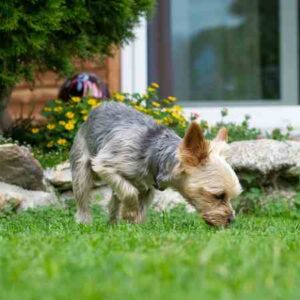As our beloved pets age, we often notice changes in their behavior that can be concerning. This is especially true for Yorkies, who are known for their spunky and lively personalities. However, the impact of aging on Yorkie behavior is a complex issue that requires careful consideration and understanding. In this article, we will explore the various ways that ageing can affect Yorkie behaviour and provide tips on how to best care for your ageing pup.
One of the most common changes in Yorkie behaviour as they age is a decrease in activity levels. As dogs get older, they may become less energetic and prefer to spend more time resting. This can lead to weight gain and decreased mobility, which can further contribute to a decrease in activity levels. It is important for owners to monitor their Yorkie’s weight and adjust their diet and exercise routine accordingly to help maintain their health and well-being.
Another common change in Yorkie behaviour as they age is an increase in anxiety and fearfulness. As dogs age, they may become more easily startled or anxious in new situations or around unfamiliar people or animals. This can be attributed to a decline in their cognitive abilities, as well as changes in their vision and hearing. Owners can help their Yorkies cope with anxiety and fear by providing a calm and consistent environment and avoiding situations that may cause stress.
In addition to changes in activity levels and anxiety, ageing can also affect a Yorkie’s cognitive abilities. Dogs, like humans, can experience cognitive decline as they age, which can lead to changes in their behaviour, such as decreased responsiveness to commands or an increase in wandering and confusion. Owners can help support their Yorkie’s cognitive abilities by providing mental stimulation through activities such as puzzle toys or training exercises.
As Yorkies age, they may also experience changes in their sleep patterns. Older dogs may sleep more than younger dogs and may experience disruptions in their sleep, such as waking up more frequently during the night. Owners can help their Yorkies get adequate rest by providing a comfortable sleeping environment and ensuring they have access to water and bathroom breaks throughout the night.
Finally, as Yorkies age, they may also experience changes in their social behaviour. Older dogs may become less tolerant of other animals or children and may prefer to spend more time alone. Owners can help their Yorkies adjust to changes in social behaviour by providing a calm and quiet environment and avoiding situations that may cause stress or over-stimulation.
In conclusion, understanding the impact of ageing on Yorkie behaviour is essential for pet owners to provide proper care and support for their furry friends. By monitoring changes in activity levels, anxiety, cognitive abilities, sleep patterns, and social behaviour, owners can help their Yorkies age gracefully and maintain a high quality of life.





